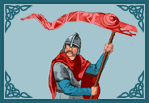 |
 |
|||
|
|
Rhodri Mawr (the Great) was the son of Merfyn Frych (the Freckled), upon whose death in AD 844 he became ruler of Gwynedd. His paternal ancestry hailed from Ynys Manaw (the Isle of Man) where Rhodri was born. However, his mother is generally accepted as having been Nesta, heiress of Powys, and his paternal grandmother was Essylt, heiress of Gwynedd (some sources give them the other way around).
At this time, the Mercians saw themselves as overlords of the Welsh. Rhodri, being an active and energetic monarch, was probably the leader of the Welsh who rebelled against them in AD 853. King Burghred of Mercia was unable to defeat them alone and sought the help of King Aethelwulf of Wessex. The West Saxon king then led an expedition into Wales, which for a time re-established the Mercian supremacy.
However, Rhodri soon became chiefly occupied in withstanding the incursions of the Vikings, who appeared in the Irish Sea in that same year and began to press hard on Wales. Upon the death of King Cyngen of Powys in AD 855, Rhodri claimed the throne of Powys in right of his mother. The following year, Irish chronicles tell how he slew a Viking leader called Gorm. By his marriage with Angharad, daughter of Meurig ap Dyfnwal, King of Seisyllwg, he also became, on the death in AD 872, of King Gwgon, her brother, ruler of Seisyllwg. His realm then extended from Anglesey to Gower.
In AD 877, Rhodri suffered a reverse at the Battle of Anglesey, known as 'Sunday's Battle', which compelled him to flee to Ireland. However, he soon returned and, in the following year, both he and his son or brother, Gwriad, were slain by the English, probably the forces of King Ceolwulf II of Mercia. This blow was so keenly felt by his subjects that a victory over the English won on the banks of the Conway, in AD 881, came to be known as 'God's vengeance for Rhodri.'
Rhodri and his wife had several children but sources vary as to who and how many. Certainly, Anarawd, Merfyn, Cadell, Aeddan, Meurig and Nesta, possibly also Gwriad, Gwyddelig and Rhodri. He also had two illegitimate children, Tudwal Gloff and Elisedd. Asser says four of six of his sons were alive at his death, although the kingdom was only divided between the eldest three: Anarawd took Gwynedd, Merfyn took Powys and Cadell took Seisyllwg.
Records of Rhodr Mawr date back to the 9th century. He is an historic personage
|
|||
| © Nash Ford Publishing 2021. All Rights Reserved. | ||||




